第三章 导语翻译
- 格式:ppt
- 大小:410.50 KB
- 文档页数:45
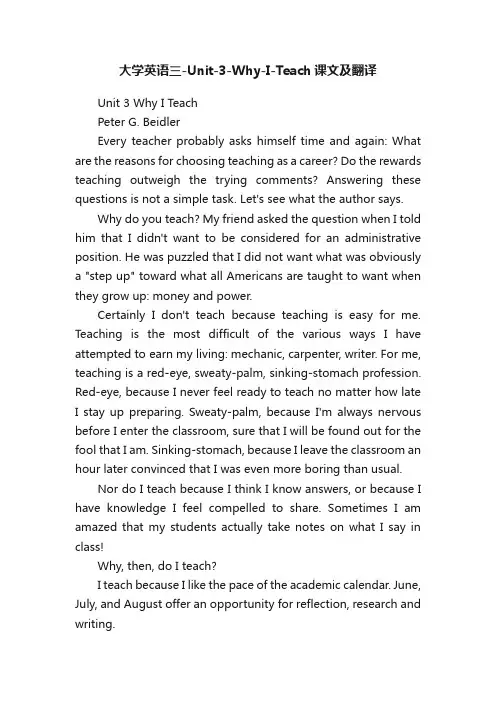
大学英语三-Unit-3-Why-I-Teach课文及翻译Unit 3 Why I TeachPeter G. BeidlerEvery teacher probably asks himself time and again: What are the reasons for choosing teaching as a career? Do the rewards teaching outweigh the trying comments? Answering these questions is not a simple task. Let's see what the author says.Why do you teach? My friend asked the question when I told him that I didn't want to be considered for an administrative position. He was puzzled that I did not want what was obviously a "step up" toward what all Americans are taught to want when they grow up: money and power.Certainly I don't teach because teaching is easy for me. Teaching is the most difficult of the various ways I have attempted to earn my living: mechanic, carpenter, writer. For me, teaching is a red-eye, sweaty-palm, sinking-stomach profession. Red-eye, because I never feel ready to teach no matter how late I stay up preparing. Sweaty-palm, because I'm always nervous before I enter the classroom, sure that I will be found out for the fool that I am. Sinking-stomach, because I leave the classroom an hour later convinced that I was even more boring than usual.Nor do I teach because I think I know answers, or because I have knowledge I feel compelled to share. Sometimes I am amazed that my students actually take notes on what I say in class!Why, then, do I teach?I teach because I like the pace of the academic calendar. June, July, and August offer an opportunity for reflection, research and writing.I teach because teaching is a profession built on change. When the material is the same, I change ——and, more important, my students change.I teach because I like the freedom to make my own mistakes, to learn my own lessons, to stimulate myself and my students. As a teacher, I'm my own boss. If I want my freshmen to learn to write by creating their own textbook, who is to say I can't? Such courses may be huge failures, but we can all learn from failures.I teach because I like to ask questions that students must struggle to answer. The world is full of right answers to bad questions. While teaching, I sometimes find good questions.I teach because I enjoy finding ways of getting myself and my students out of the ivory tower and into the real world. I once taught a course called "Self-Reliance in a Technological Society." My 15 students read Emerson, Thoreau, and Huxley. They kept diaries. They wrote term papers.But we also set up a corporation, borrowed money, purchased a run-down house and practiced self-reliance by renovating it. At the end of the semester, we would the house, repaid our loan, paid or taxes, and distributed the profits among the group.So teaching gives me pace, and variety, and challenge, and the opportunity to keep on learning.I have left out, however, the most important reasons why I teach.One is Vicky. My first doctoral student, Vicky was an energetic student who labored at her dissertation on a little-known 14th century poet. She wrote articles and sent them off to learned journals. She did it all herself, with an occasional nudge from me. But I was there when she finished her dissertation,learned that her articles were accepted, got a job and won a fellowship to Harvard working on a book developing ideas she'd first had as my student.Another reason is George, who started as an engineering student, then switched to English because he decided he liked people better than things.There is Jeanne, who left college, but was brought back by her classmates because they wanted her to see the end of the self-reliance house project. I was here when she came back. I was there when she told me that she later became interested in the urban poor and went on to become a civil rights lawyer.There is Jacqui, a cleaning woman who knows more by intuition than most of us learn by analysis. Jacqui has decided to finish high school and go to college.These are the real reasons I teach, these people who grow and change in front of me. Being a teacher is being present at the creation, when the clay begins to breathe.A "promotion" out of teaching would give me money and power. But I have money. I get paid to do what I enjoy: reading, talking with people, and asking question like, "What is the point of being rich?"And I have power. I have the power to nudge, to fan sparks, to suggest books, to point out a pathway. What other power matters?But teaching offers something besides money and power: it offers love.Not only the love of learning and of books and ideas, but also the love that a teacher feels for that rare student who walks into a teacher's life and begins to breathe. Perhaps love is the wrong word: magic might be better.I teach because, being around people who are beginning to breathe, I occasionally find myself catching my breath with them.我为何教书你为什么教书呢?当我告诉我的朋友我不想做任何行政职务时,他向我提出了这个问题。
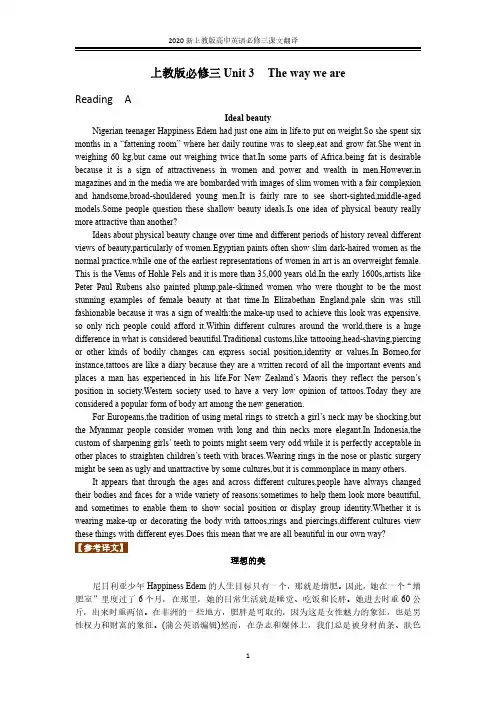
上教版必修三Unit3The way we areReading AIdeal beautyNigerian teenager Happiness Edem had just one aim in life:to put on weight.So she spent six months in a“fattening room”where her daily routine was to sleep,eat and grow fat.She went in weighing60kg,but came out weighing twice that.In some parts of Africa,being fat is desirable because it is a sign of attractiveness in women and power and wealth in men.However,in magazines and in the media we are bombarded with images of slim women with a fair complexion and handsome,broad-shouldered young men.It is fairly rare to see short-sighted,middle-aged models.Some people question these shallow beauty ideals.Is one idea of physical beauty really more attractive than another?Ideas about physical beauty change over time and different periods of history reveal different views of beauty,particularly of women.Egyptian paints often show slim dark-haired women as the normal practice,while one of the earliest representations of women in art is an overweight female. This is the Venus of Hohle Fels and it is more than35,000years old.In the early1600s,artists like Peter Paul Rubens also painted plump,pale-skinned women who were thought to be the most stunning examples of female beauty at that time.In Elizabethan England,pale skin was still fashionable because it was a sign of wealth:the make-up used to achieve this look was expensive, so only rich people could afford it.Within different cultures around the world,there is a huge difference in what is considered beautiful.Traditional customs,like tattooing,head-shaving,piercing or other kinds of bodily changes can express social position,identity or values.In Borneo,for instance,tattoos are like a diary because they are a written record of all the important events and places a man has experienced in his life.For New Zealand’s Maoris they reflect the person’s position in society.Western society used to have a very low opinion of tattoos.Today they are considered a popular form of body art among the new generation.For Europeans,the tradition of using metal rings to stretch a girl’s neck may be shocking,but the Myanmar people consider women with long and thin necks more elegant.In Indonesia,the custom of sharpening girls’teeth to points might seem very odd while it is perfectly acceptable in other places to straighten children’s teeth with braces.Wearing rings in the nose or plastic surgery might be seen as ugly and unattractive by some cultures,but it is commonplace in many others.It appears that through the ages and across different cultures,people have always changed their bodies and faces for a wide variety of reasons:sometimes to help them look more beautiful, and sometimes to enable them to show social position or display group identity.Whether it is wearing make-up or decorating the body with tattoos,rings and piercings,different cultures view these things with different eyes.Does this mean that we are all beautiful in our own way?理想的美尼日利亚少年Happiness Edem的人生目标只有一个,那就是增肥。
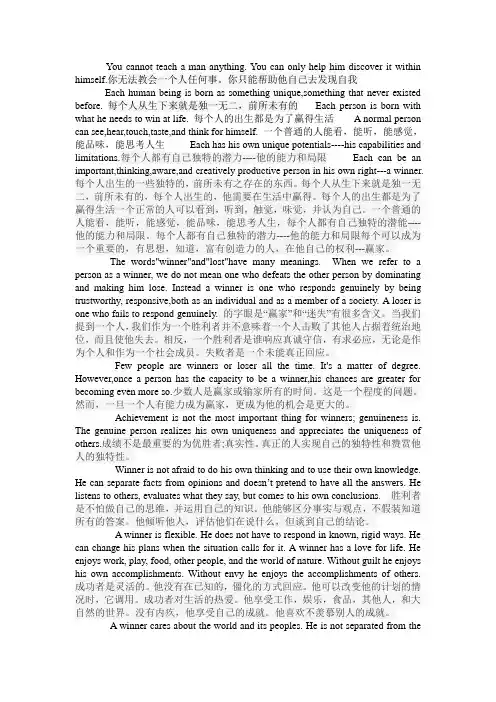
You cannot teach a man anything. You can only help him discover it within himself.你无法教会一个人任何事。
你只能帮助他自己去发现自我Each human being is born as something unique,something that never existed before. 每个人从生下来就是独一无二,前所未有的Each person is born with what he needs to win at life. 每个人的出生都是为了赢得生活 A normal person can see,hear,touch,taste,and think for himself. 一个普通的人能看,能听,能感觉,能品味,能思考人生Each has his own unique potentials----his capabilities and limitations.每个人都有自己独特的潜力----他的能力和局限Each can be an important,thinking,aware,and creatively productive person in his own right---a winner.每个人出生的一些独特的,前所未有之存在的东西。
每个人从生下来就是独一无二,前所未有的,每个人出生的,他需要在生活中赢得。
每个人的出生都是为了赢得生活一个正常的人可以看到,听到,触觉,味觉,并认为自己。
一个普通的人能看,能听,能感觉,能品味,能思考人生,每个人都有自己独特的潜能----他的能力和局限。
每个人都有自己独特的潜力----他的能力和局限每个可以成为一个重要的,有思想,知道,富有创造力的人,在他自己的权利---赢家。
The words"winner"and"lost"have many meanings. When we refer to a person as a winner, we do not mean one who defeats the other person by dominating and making him lose. Instead a winner is one who responds genuinely by being trustworthy, responsive,both as an individual and as a member of a society. A loser is one who fails to respond genuinely.的字眼是“赢家”和“迷失”有很多含义。
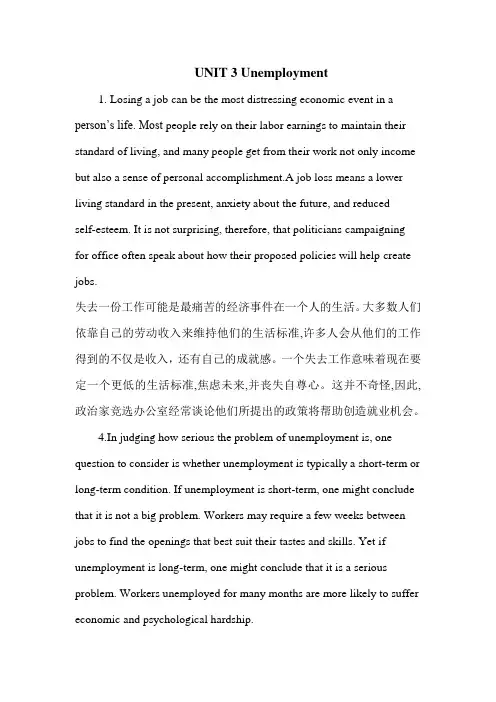
UNIT 3 Unemployment1. Losing a job can be the most distressing economic event in a person’s life. Most people rely on their labor earnings to maintain their standard of living, and many people get from their work not only income but also a sense of personal accomplishment.A job loss means a lower living standard in the present, anxiety about the future, and reducedself-esteem. It is not surprising, therefore, that politicians campaigning for office often speak about how their proposed policies will help create jobs.失去一份工作可能是最痛苦的经济事件在一个人的生活。
大多数人们依靠自己的劳动收入来维持他们的生活标准,许多人会从他们的工作得到的不仅是收入,还有自己的成就感。
一个失去工作意味着现在要定一个更低的生活标准,焦虑未来,并丧失自尊心。
这并不奇怪,因此,政治家竞选办公室经常谈论他们所提出的政策将帮助创造就业机会。
4.In judging how serious the problem of unemployment is, one question to consider is whether unemployment is typically a short-term or long-term condition. If unemployment is short-term, one might conclude that it is not a big problem. Workers may require a few weeks between jobs to find the openings that best suit their tastes and skills. Yet if unemployment is long-term, one might conclude that it is a serious problem. Workers unemployed for many months are more likely to suffer economic and psychological hardship.判断失业问题有多么严重时,其中一个问题就是要考虑是否失业通常是一个短期或长期的条件。
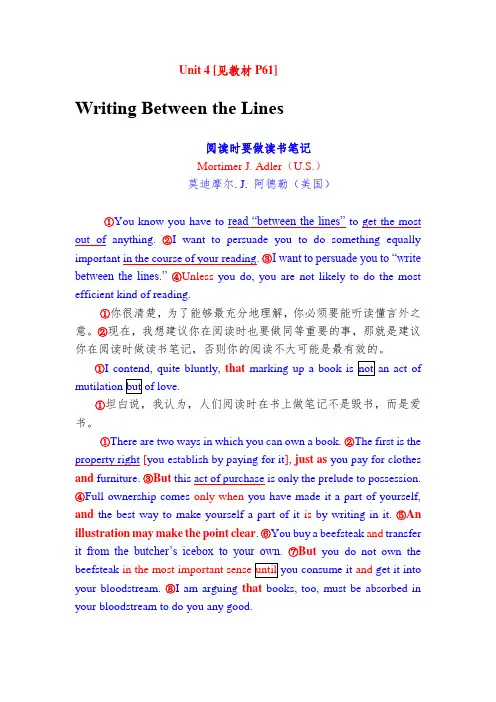
Unit4 [见教材P61]Writing Between the Lines阅读时要做读书笔记Mortimer J. Adler(U.S.)莫迪摩尔. J. 阿德勒(美国)①You know you have to read “between the lines” to get the most out of anything. ②I want to persuade you to do something equally important in the course of your reading. ③I want to persuade you to “write between the lines.” ④Unless you do, you are not likely to do the most efficient kind of reading.①你很清楚,为了能够最充分地理解,你必须要能听读懂言外之意。
②现在,我想建议你在阅读时也要做同等重要的事,那就是建议你在阅读时做读书笔记,否则你的阅读不大可能是最有效的。
①I contend, quite bluntly, that①坦白说,我认为,人们阅读时在书上做笔记不是毁书,而是爱书。
①There are two ways in which you can own a book. ②The first is the property right[you establish by paying for it], just as you pay for clothes and furniture. ③But this act of purchase is only the prelude to possession. ④Full ownership comes only when you have made it a part of yourself, and the best way to make yourself a part of it is by writing in it.⑤An illustration may make the point clear. ⑥You buy a beefsteak and transfer it from the butcher’s icebox to your own. ⑦But you do not ownthe beefsteak and get it into your bloodstream. ⑧I am arguing that books, too, must be absorbed in your bloodstream to do you any good.①人们可以通过两种方式来拥有一本书。
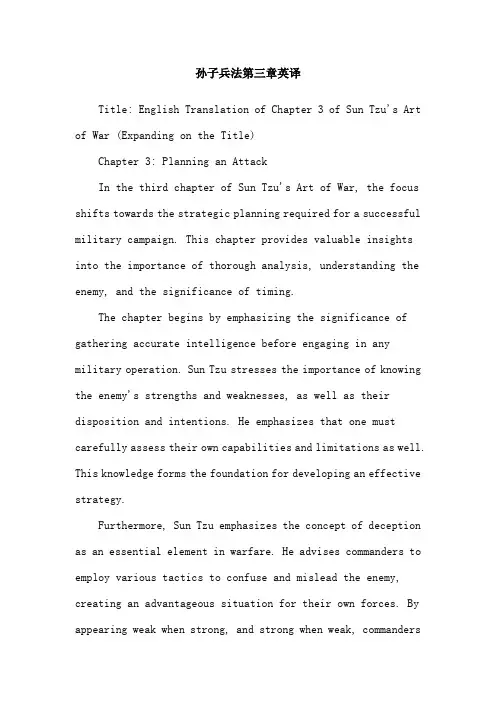
孙子兵法第三章英译Title: English Translation of Chapter 3 of Sun Tzu's Art of War (Expanding on the Title)Chapter 3: Planning an AttackIn the third chapter of Sun Tzu's Art of War, the focus shifts towards the strategic planning required for a successful military campaign. This chapter provides valuable insights into the importance of thorough analysis, understanding the enemy, and the significance of timing.The chapter begins by emphasizing the significance of gathering accurate intelligence before engaging in any military operation. Sun Tzu stresses the importance of knowing the enemy's strengths and weaknesses, as well as their disposition and intentions. He emphasizes that one must carefully assess their own capabilities and limitations as well. This knowledge forms the foundation for developing an effective strategy.Furthermore, Sun Tzu emphasizes the concept of deception as an essential element in warfare. He advises commanders to employ various tactics to confuse and mislead the enemy, creating an advantageous situation for their own forces. By appearing weak when strong, and strong when weak, commanderscan manipulate their opponent's perceptions and gain a strategic advantage.Timing is another critical factor highlighted in this chapter. Sun Tzu emphasizes that successful commanders understand the significance of seizing opportunities at the right moment. The ability to strike when the enemy is least prepared can lead to a swift and decisive victory. Conversely, engaging in battle prematurely or without adequate preparation can lead to defeat.To successfully carry out a military operation, Sun Tzu emphasizes the importance of proper planning and meticulous organization. He stresses that a well-structured and disciplined army is more likely to achieve victory. This involves establishing clear lines of communication, coordinating different units effectively, and maintaining a high level of morale among the troops.In this chapter, Sun Tzu also addresses the concept of victory without fighting. He argues that the ultimate goal of warfare is not necessarily to engage in direct combat, but rather to achieve one's objectives with minimal loss. By employing diplomatic strategies, negotiation, and alliances, commanders can accomplish their goals without resorting toviolence. This approach reflects Sun Tzu's belief in the importance of preserving resources and ensuring long-term stability.In conclusion, the third chapter of Sun Tzu's Art of War provides valuable insights into the planning and execution of military campaigns. It underscores the importance of gathering intelligence, understanding the enemy, employing deception, and seizing the right opportunities. By adhering to these principles, commanders can increase their chances of achieving victory while minimizing casualties and preserving resources. This chapter serves as a timeless guide for military strategists and leaders, transcending time and remaining relevant in today's complex world.。
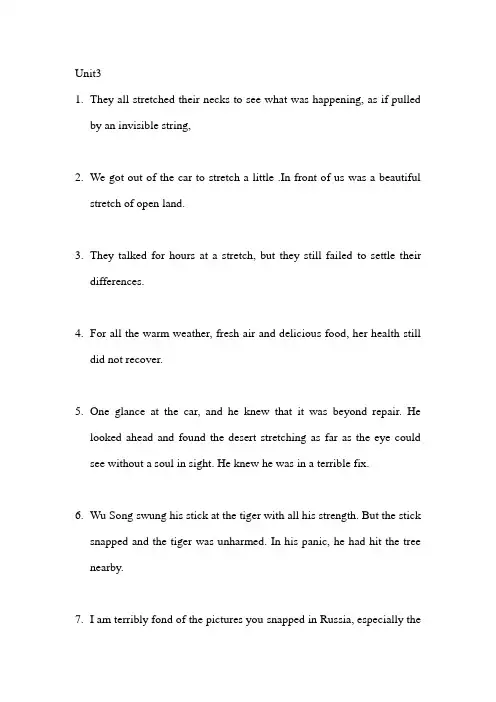
Unit31.They all stretched their necks to see what was happening, as if pulledby an invisible string,2.We got out of the car to stretch a little .In front of us was a beautifulstretch of open land.3.They talked for hours at a stretch, but they still failed to settle theirdifferences.4.For all the warm weather, fresh air and delicious food, her health stilldid not recover.5.One glance at the car, and he knew that it was beyond repair. Helooked ahead and found the desert stretching as far as the eye could see without a soul in sight. He knew he was in a terrible fix.6.Wu Song swung his stick at the tiger with all his strength. But the sticksnapped and the tiger was unharmed. In his panic, he had hit the tree nearby.7.I am terribly fond of the pictures you snapped in Russia, especially theone showing the Russian coachman sitting by the Black Sea with his supper in a cloth on his knees.8.“You can’t just let it go at that,” I tried to plead with him.“It is none of your business,” he snapped.9.He snapped his briefcase to, stood up, and said “Then it’s all settled.”10.H e was standing in front of his house on a hill, only about a hundredmeters apart/away from the wharf when the tsunami came.。
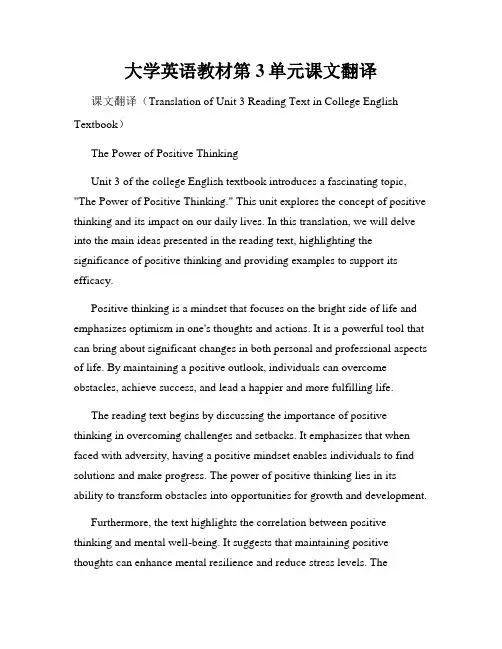
大学英语教材第3单元课文翻译课文翻译(Translation of Unit 3 Reading Text in College English Textbook)The Power of Positive ThinkingUnit 3 of the college English textbook introduces a fascinating topic, "The Power of Positive Thinking." This unit explores the concept of positive thinking and its impact on our daily lives. In this translation, we will delve into the main ideas presented in the reading text, highlighting the significance of positive thinking and providing examples to support its efficacy.Positive thinking is a mindset that focuses on the bright side of life and emphasizes optimism in one's thoughts and actions. It is a powerful tool that can bring about significant changes in both personal and professional aspects of life. By maintaining a positive outlook, individuals can overcome obstacles, achieve success, and lead a happier and more fulfilling life.The reading text begins by discussing the importance of positive thinking in overcoming challenges and setbacks. It emphasizes that when faced with adversity, having a positive mindset enables individuals to find solutions and make progress. The power of positive thinking lies in its ability to transform obstacles into opportunities for growth and development.Furthermore, the text highlights the correlation between positive thinking and mental well-being. It suggests that maintaining positive thoughts can enhance mental resilience and reduce stress levels. Theoptimism cultivated through positive thinking promotes better emotional health and offers a sense of control over one's life.The reading text also emphasizes the impact of positive thinking on success. It argues that by embracing a positive attitude, individuals can enhance their performance and increase their chances of achieving their goals. Positive thinking enhances motivation and perseverance, allowing individuals to overcome obstacles and reach their desired outcomes.Real-life examples support the claims made in the reading text. The story of Thomas Edison serves as an illustration of the power of positive thinking. Despite facing numerous failures in his quest to invent the electric light bulb, Edison maintained his optimism and believed in his abilities. His unwavering positive mindset eventually led to his success, demonstrating the transformative power of positive thinking.In conclusion, the reading text in the third unit of the college English textbook emphasizes the significance of positive thinking in our lives. It suggests that by cultivating a positive mindset, individuals can overcome challenges, enhance their mental well-being, and increase their chances of success. The power of positive thinking lies in its ability to shape our thoughts and actions, enabling us to lead more fulfilling lives. Let us embrace the power of positive thinking and make a difference in our own lives and the lives of those around us.(Note: The above translation is an example and may not be an actual translation of the Unit 3 reading text in a college English textbook. The provided content is solely for illustrative purposes.)。
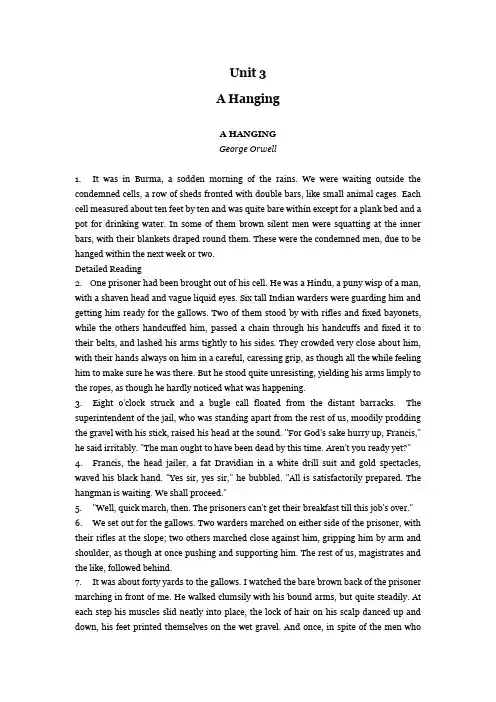
Unit 3A HangingA HANGINGGeorge Orwell1. It was in Burma, a sodden morning of the rains. We were waiting outside the condemned cells, a row of sheds fronted with double bars, like small animal cages. Each cell measured about ten feet by ten and was quite bare within except for a plank bed and a pot for drinking water. In some of them brown silent men were squatting at the inner bars, with their blankets draped round them. These were the condemned men, due to be hanged within the next week or two.Detailed Reading2. One prisoner had been brought out of his cell. He was a Hindu, a puny wisp of a man, with a shaven head and vague liquid eyes. Six tall Indian warders were guarding him and getting him ready for the gallows. Two of them stood by with rifles and fixed bayonets, while the others handcuffed him, passed a chain through his handcuffs and fixed it to their belts, and lashed his arms tightly to his sides. They crowded very close about him, with their hands always on him in a careful, caressing grip, as though all the while feeling him to make sure he was there. But he stood quite unresisting, yielding his arms limply to the ropes, as though he hardly noticed what was happening.3. Eight o'clock struck and a bugle call floated from the distant barracks. The superintendent of the jail, who was standing apart from the rest of us, moodily prodding the gravel with his stick, raised his head at the sound. "For God's sake hurry up, Francis," he said irritably. "The man ought to have been dead by this time. Aren't you ready yet?"4. Francis, the head jailer, a fat Dravidian in a white drill suit and gold spectacles, waved his black hand. "Yes sir, yes sir," he bubbled. "All is satisfactorily prepared. The hangman is waiting. We shall proceed."5. "Well, quick march, then. The prisoners can't get their breakfast till this job's over."6. We set out for the gallows. Two warders marched on either side of the prisoner, with their rifles at the slope; two others marched close against him, gripping him by arm and shoulder, as though at once pushing and supporting him. The rest of us, magistrates and the like, followed behind.7. It was about forty yards to the gallows. I watched the bare brown back of the prisoner marching in front of me. He walked clumsily with his bound arms, but quite steadily. At each step his muscles slid neatly into place, the lock of hair on his scalp danced up and down, his feet printed themselves on the wet gravel. And once, in spite of the men whogripped him by each shoulder, he stepped slightly aside to avoid a puddle on the path.8. It is curious, but till that moment I had never realized what it means to destroy a healthy, conscious man. When I saw the prisoner step aside to avoid the puddle I saw the mystery, the unspeakable wrongness, of cutting a life short when it is in full tide. This man was not dying, he was alive just as we are alive. All the organs of his body were working -- bowels digesting food, skin renewing itself, nails growing, tissues forming -- all toiling away in solemn foolery. His nails would still be growing when he stood on the drop, when he was falling through the air with a tenth of a second to live. His eyes saw the yellow gravel and the gray walls, and his brain still remembered, foresaw, reasoned -- reasoned even about puddles. He and we were a party of men walking together, seeing, hearing, feeling, understanding the same world; and in two minutes, with a sudden snap, one of us would be gone -- one mind less, one world less.9. The gallows stood in a small yard. The hangman, a gray-haired convict in the white uniform of the prison, was waiting beside his machine. He greeted us with a servile crouch as we entered. At a word from Francis the two warders, gripping the prisoner more closely than ever, half led half pushed him to the gallows and helped him clumsily up the ladder. Then the hangman climbed up and fixed the rope around the prisoner's neck.10. We stood waiting, five yards away. The warders had formed a rough circle round the gallows. And then, when the noose was fixed, the prisoner began crying out to his god. It was a high, reiterated cry of "Ram! Ram! Ram! Ram!" not urgent and fearful like a prayer or a cry for help, but steady, rhythmical, almost like the tolling of a bell.11. The hangman climbed down and stood ready, holding the lever. Minutes seemed to pass. The steady crying from the prisoner went on and on, "Ram! Ram! Ram!" never faltering for an instant. The superintendent, his head on his chest, was slowly poking the ground with his stick; perhaps he was counting the cries, allowing the prisoner a fixed number -- fifty, perhaps, or a hundred. Everyone had changed color. The Indians had gone gray like bad coffee, and one or two of the bayonets were wavering.12. Suddenly the superintendent made up his mind. Throwing up his head he made a swift motion with his stick. "Chalo!" he shouted almost fiercely.13. There was a clanking noise, and then dead silence. The prisoner had vanished, and the rope was twisting on itself. We went round the gallows to inspect the prisoner's body. He was dangling with his toes pointing straight downward. Very slowly revolving, as dead as a stone.14. The superintendent reached out with his stick and poked the bare brown body; it oscillated slightly. "He's all right," said the superintendent. He backed out from under the gallows, and blew out a deep breath. The moody look had gone out of his face quite suddenly. He glanced at his wrist watch. "Eight minutes past eight. Well, that's all for this morning, thank God."15. The warders unfixed bayonets and marched away. We walked out of the gallows yard, past the condemned cells with their waiting prisoners, into the big central yard of the prison. The convicts were already receiving their breakfast. They squatted in long rows, each man holding a tin pannikin, while two warders with buckets march round ladling out rice; it seemed quite a homely, jolly scene, after the hanging. An enormous relief had come upon us now that the job was done. One felt an impulse to sing, to break into a run, to snigger. All at once everyone began chattering gaily.16. The Eurasian boy walking beside me nodded toward the way we had come, with a knowing smile, "Do you know sir, our friend (he meant the dead man) when he heard his appeal had been dismissed, he pissed on the floor of his cell. From fright. Kindly take one of my cigarettes, sir. Do you not admire my new silver case, sir? Classy European style."17. Several people laughed -- at what, nobody seemed certain.18. Francis was walking by the superintendent, talking garrulously, "Well, sir, all has passed off with the utmost satisfactoriness. It was all finished -- flick! Like that. It is not always so -- oah no! I have known cases where the doctor was obliged to go beneath the gallows and pull the prisoner's legs to ensure decease. Most disagreeable."19. "Wriggling about, eh? That's bad," said the superintendent.20. "Ach, sir, it is worse when they become refractory! One man, I recall, clung to the bars of his cage when we went to take him out. You will scarcely credit, sir, that it took six warders to dislodge him, three pulling at each leg."21. I found that I was laughing quite loudly. Everyone was laughing. Even the superintendent grinned in a tolerant way. "You'd better all come and have a drink," he said quite genially. "I've got a bottle of whiskey in the car. We could do with it."22. We went through the big double gates of the prison into the road. "Pulling at his legs!" exclaimed a Burmese magistrate suddenly, and burst into a loud chuckling. We all began laughing again. At that moment Francis' anecdote seemed extraordinarily funny. We all had a drink together, native and European alike, quite amicably. The dead man was a hundred yards away.1. 那是发生在缅甸的事情。

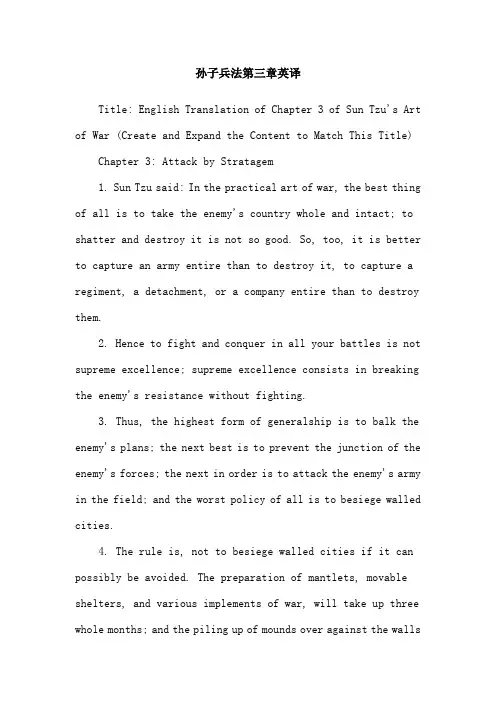
孙子兵法第三章英译Title: English Translation of Chapter 3 of Sun Tzu's Art of War (Create and Expand the Content to Match This Title) Chapter 3: Attack by Stratagem1. Sun Tzu said: In the practical art of war, the best thing of all is to take the enemy's country whole and intact; to shatter and destroy it is not so good. So, too, it is better to capture an army entire than to destroy it, to capture a regiment, a detachment, or a company entire than to destroy them.2. Hence to fight and conquer in all your battles is not supreme excellence; supreme excellence consists in breaking the enemy's resistance without fighting.3. Thus, the highest form of generalship is to balk the enemy's plans; the next best is to prevent the junction of the enemy's forces; the next in order is to attack the enemy's army in the field; and the worst policy of all is to besiege walled cities.4. The rule is, not to besiege walled cities if it can possibly be avoided. The preparation of mantlets, movable shelters, and various implements of war, will take up three whole months; and the piling up of mounds over against the wallswill take three months more.5. The general, unable to control his irritation, will launch his men to the assault like swarming ants, with the result that one-third of his men are slain, while the town still remains untaken. Such are the disastrous effects of a siege.6. Therefore the skillful leader subdues the enemy's troops without any fighting; he captures their cities without laying siege to them; he overthrows their kingdom without lengthy operations in the field.7. With his forces intact he will dispute the mastery of the Empire, and thus, without losing a man, his triumph will be complete. This is the method of attacking by stratagem.This chapter of Sun Tzu's Art of War highlights the importance of strategic thinking and planning in warfare. It emphasizes the superiority of capturing the enemy's country, army, or troops intact rather than destroying them. Sun Tzu suggests that the ultimate goal of warfare is to break the enemy's resistance without engaging in direct combat.The chapter outlines different levels of generalship, starting with the highest form of thwarting the enemy's plans, followed by preventing the enemy's forces from joining together, and then engaging the enemy's army in the field. The chapteralso advises against besieging walled cities unless absolutely necessary, as it requires significant time, resources, and often results in heavy casualties.Sun Tzu emphasizes the importance of subduing the enemy without fighting, capturing cities without sieges, and overthrowing kingdoms without lengthy operations. A skillful leader, according to Sun Tzu, can achieve victory without losing a single soldier.This chapter serves as a reminder that victory in war is not solely dependent on brute force, but rather on strategic thinking, planning, and the ability to outmaneuver the enemy. It underscores the significance of using intelligence, deception, and unconventional tactics to gain an advantage over the adversary. By attacking through stratagem, a commander can secure a decisive triumph while minimizing the cost in terms of human lives and resources.。
unit3精读翻译To the victor belongs the language语言是文化的地图。
它告诉你人们从哪儿来到哪儿去。
一份英语语言研究的报告揭露了一段引人注目的历史和惊人的功能。
这是存活者的语言,是征服者的语言,是笑声的语言。
一个单词比起固定不变的存在来说,更像是一个钟摆。
它可以扫过你的耳朵,并十分可靠地暗示你隐含意思,前意识的联系。
听听这些单词:血,安静的,民主。
除了他们的字面意思,也携带者文化的关联和私人的关联。
一个单词就可以不稳定的阐明这个意思:循环。
这个单词是在14世纪,经由法国,从拉丁语进入英语的。
(至少,那是这个单词第一次被书写的时候,可能更早的时候就有人口头使用它了。
)“循环”意味着转圈圈,那就是它的使用方法。
很多时候,循环会被用到天文学里来描述一个在宇宙中旋转的行星。
这个单词没有政治性含义。
反抗是武装的政治性词语。
它也来自于拉丁语(就像辞海里60%的单词一样),它也意味着一场战争的复兴。
在14世纪,反抗被用来表明对于合法权威的阻力。
这可以衍生出有趣的结果。
不管哪边胜利,都会称失败者为反叛者。
——他们,那些胜利者,就是优点和更多火药的聚集地。
这个意思一直流传至今。
同盟国的战士就被叫做反叛者。
自从北边赢了战役之后,就会作为叛乱者而不是革命者解散。
赢了战役的人就可以重新定义语言。
改革在至少16世纪之前都没有在英语里获得一个政治性意义。
他的意思———一个循环的行动———仍然与原来意思相联系但是有些渐渐变得与政治有关了。
它现在可以意味着能力的回旋。
这比你能想象的要复杂的多。
Unit3 Oslp1.I remember on my first trip to Europe going alone to a movie in Copenhagen. In Denmark you are given a ticket for an assigned seat. I went into the cinema and discovered that my ticket directed me to sit beside the only other people in the place,a young couple locked in the sort of passionate embrace associated with dockside reunions at the end of long wars. I could no more have sat beside them than I could have asked to join in-it would have come to much the same thing- so I took a place a few discreet seats away.1记得我第一次去欧洲旅行的时候,我在哥本哈根独自一人去看电影。
在丹麦,电影票是对号入座的。
(此文来自袁勇兵博客)我走进电影院,发现在我的票对应的座位旁,只有一对年轻情侣。
这对情侣如胶似漆地拥抱在一起,如同一场持久战争结束后码头上亲人的团聚。
我很不情愿坐在他们旁边,就如我绝不会要求加入他们的行为一样——这两者对我来说并没有什么不同——因此我谨慎地隔几个座位坐了下来。
2. People came into the cinema, consulted their tickets and filled the seats around us. By the time the film started there were about 30 of us sitting together in a tight pack in the middle of a vast and otherwise empty auditorium. Two minutes into the movie, a woman laden with shopping made her way with difficulty down my row, stopped beside my seat and told me in a stern voice, full of glottal stops and indignation, that I was in her place. This caused much play of flashlights among the usherettes and fretful re-examining of tickets by everyone in the vicinity until word got around that I was an American tourist and therefore unable to follow simple seating instructions and. I was escorted in some shame back to my assigned place.2人们陆续地走进影院,参照电影票找到位子,在我们周围坐了下来。
第三单元Translation of Text A土地的讯息皮拉·萨哈姆1 是的,这些事我们家的稻田,以前归我父母,再往前属于我的祖先。
这片土地已有三百多年的历史了。
我是家里唯一的闺女,我一直留在我父母身边,知道他们去世。
按照我们伊萨的习俗,我的三个兄弟已结婚就都搬到他们老婆家去了,我老伴进了我家的门。
那是我十八岁,他十九岁。
我们俩生了六个孩子,两个没长大就病死了。
其余的俩儿子、俩闺女一到我们有钱给他们买牛仔裤的时候就都离开了家。
大儿子在曼谷找了份工作,给一家有钱人当花匠,后来一家劳务公司介绍他都国外去干活了,小儿子也去了挺远的地方。
2 我们的一个闺女在曼谷一家纺织厂里干活,另外一个闺女在一家商店里工作。
有时候她们会回来看我们,呆上几天就走,她们不时寄些钱回来,捎话回来说她们挺好的。
我知道她们说的不全是实话,有时候,她们受欺负、受侮辱,想到这些,我就觉得像一把尖刀扎进我的心头。
对我老伴来说还好受些,他有耳朵么也听不见,有嘴么也不说,有眼睛么也看不见。
他老是什么事都不着急,什么话也不说,只操心他自己的那点事。
3 虽说这些孩子长期不在我身边,但他们永远都是我的孩子,他们一个个都走了,这可能就是命吧。
我们的那块地不大,连年的使用已使它不再肥沃,就像我们老两口儿,慢慢老下去,且疲惫不堪。
不过我和老伴还在这块地力里干活儿,雨量充足的时候,地还不难耕种,老天爷不下雨的年份,不光是我们的犁断了,我们的心也碎了。
4 没,我们俩没怎么变,可我们的村子变了哪些地方变了?就在十年以前,我们还能以物换物,可如今都用钱了。
几年前,我们还能请街坊来帮忙盖房子、收割稻子或是打井。
这会儿,都得付钱,他们才肯帮忙。
塑料玩意替代了村里手工做的东西,以前男人们还做点竹器,可如今没人干了。
现在村里到处都是乱扔的塑料袋,一下子冒出来不少商店,里面放满了五颜六色的塑料玩意,还有些我们用不上的东西。
年轻人都去镇上和城里打工,留下我们这些老年人种地。
Unit 3百万英镑THE MILLION POUND BANK NOTEAct I, Scene 3第一幕第3场NARRATOR:旁白:It is the summer of 1903.1903年的夏天。
Two old and wealthy brothers, Roderick and Oliver, have made a bet.一对年老又富有的兄弟,罗德里克和奥利弗,打了一个赌。
Oliver believes that with a million pound bank note奥利弗认为,一个人靠一张百万英镑的钞票a man could survive a month in London.在伦敦能活一个月。
His brother Roderick doubts it.他的兄弟罗德里克对此表示怀疑。
At this moment, they see a penniless young man wandering on the pavement outside their house.这时,他们看见一个身无分文的年轻人在房子外面的人行道上游荡。
It is Henry Adams, an American businessman,他叫亨利•亚当斯,一个美国商人。
who is lost in London and does not know what he should do.他在伦敦迷了路,不知道该怎么办。
RODERICK: Young man, would you step inside a moment, please?罗德里克:年轻人,请你进来一下好吗?HENRY: Who? Me, sir?亨利:先生,你叫谁呀?是叫我吗?RODERICK: Yes, you.罗德里克:是的,就是你。
OLIVER: Through the front door on your left.奥利弗:从你左侧的前门进来。